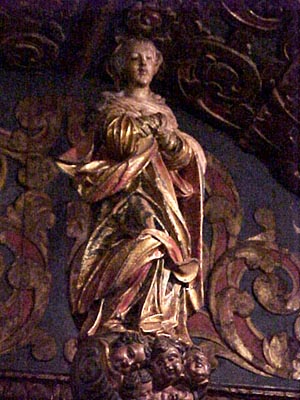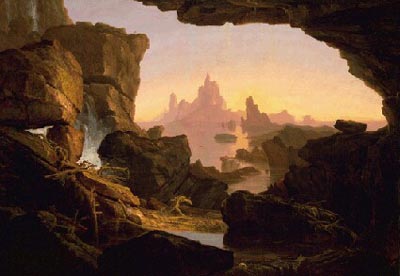 |
Feast Days of Our Lady
Expectation of Our Lady - December 18
Prof. Plinio Corrêa de Oliveira
December 18 begins the last week of Advent, which the Church calls the Week of Expectation. We are only one week away from the Birth of Our Lord, and the Church imagines the jubilation and hope of Our Lady in expectation of her parturition: she was waiting to admire the Blessed Face of the Son she was generating in her womb.

Our Lady of the Expectation, in Sabará, Brazil |
Our Lady had begged God to hasten the coming of the Messiah, God heard her omnipotent prayer, and the Incarnation in fact was anticipated. She was invited to be the Mother of the Word. She accepted, and conceived the Incarnate Word in her womb. In this last week of her gestation, she is waiting with expectation to see the Face of her Son so that she might have a more profound knowledge of His soul and His full personality.
She also awaits the salvation of the world that approaches. She sees the hour coming when the glory of God will cease to be offended by the legacy of original sin. The Devil’s reign that dominated for more than 4,000 years is drawing to its end. She senses that the Reign of Our Lord Jesus Christ is near. Only one week is lacking for the birth of the Word that marks the beginning of the end of the reign of the Devil. It was definitely destroyed when Our Lord was immolated on the Cross and the Redemption was consummated.
These considerations filled the heart of Our Lady with hope. That is why during this period of waiting she is called Our Lady of the Expectation, Our Lady of the Hope or Our Lady of the O!, since on each of the seven days before Christmas there is an antiphon in the liturgy that the Church attributes to her. All of these antiphons begin with the exclamation – O! – and continue with adapted words of the Old Testament that refer to the birth of Our Lord and His Redemption.
These antiphons, called the "Greater Antiphons" or the "O Antiphons," are the following:
Antiphon 1: O Wisdom! Thou came forth from the mouth of the Most High and, reaching from beginning to end, Thou ordered all things mightily and sweetly. Come, and teach us the way of prudence.
Antiphon 2: O Adonai, Ruler of the House of Israel! Thou appeared to Moses in the fire of the burning bush and on Mount Sinai gave him Thy law. Come to redeem us with the strength of Thy arm.
Antiphon 3: O Root of Jesse! Thou stand as a sign for all peoples; before Thee kings shall keep silence and to Thee all nations shall have recourse. Come, save us, and do not delay.
Antiphon 4: O Key of David, Scepter of the House of Israel! Thou doth open and no man closes; Thou doth close and no man opens. Come, and deliver from the chains of prison those who sit in darkness and in the shadow of death.
Antiphon 5: O Rising Dawn, Radiance of the Light eternal and Sun of Justice! Come and enlighten those who sit in darkness and in the shadow of death.
Antiphon 6: O King of the Gentile, the Awaited One of all! Thou are the cornerstone that binds two into one. Come, and save man whom Thou fashioned out of clay.
Antiphon 7: O Emmanuel, our King and Lawgiver, the Hope and Salvation of the nations! Come and save us, O Lord our God.
The O Antiphons suggest to us some thoughts.
When the encyclical Divini Redemptoris of Pius XI against Communism was published in 1937, the Pontiff noted in it that the world was in such a bad state that it was in danger of falling to a state lower than it was before the Redemption. And indeed, we can say that it fell. From 1937 to this date, the catastrophe has happened. The many evils described by Pius XI have only increased since his time. The world redeemed by Jesus Christ is now at a lower state than before His coming.

A dawn after the Deluge by Thomas Cole |
In this situation we long for a restoration so radical that it is similar to a redemption. We hope for a renewal of the fruits of Redemption applied to the needs of our times. We have need of the punishment of those who despise Our Lord and have infiltrated into the deepest recesses of His Church. If they could, they would destroy her. We also call for those who can convert to be regenerated and reconciled with Our Lord. We need the Reign of Mary to be implanted.
So, for us, in the days that precede Christmas, these antiphons should express an appeal and a plea to the Infant Jesus to hasten a stronger and more triumphant and invincible action to re-implant His Kingdom on earth - with Mary, in Mary and through Mary.
We should ask Our Lady to obtain this from her Son. We also should ask her to increase our hope that this will happen. In this way, we will pass this week in expectation of these graces as Our Lady was waiting for the graces of Our Lord’s coming before the feast of Christmas.


  | | Prof. Plinio Corrêa de Oliveira | |
The Saint of the Day features highlights from the lives of saints based on comments made by the late Prof. Plinio Corrêa de Oliveira. Following the example of St. John Bosco who used to make similar talks for the boys of his College, each evening it was Prof. Plinio’s custom to make a short commentary on the lives of the next day’s saint in a meeting for youth in order to encourage them in the practice of virtue and love for the Catholic Church. TIA thought that its readers could profit from these valuable commentaries.
The texts of both the biographical data and the comments come from personal notes taken by Atila S. Guimarães from 1964 to 1995. Given the fact that the source is a personal notebook, it is possible that at times the biographic notes transcribed here will not rigorously follow the original text read by Prof. Plinio. The commentaries have also been adapted and translated for TIA’s site.
|
Saint of the Day | Home | Books | CDs | Search | Contact Us | Donate

© 2002- Tradition in Action, Inc. All Rights Reserved
|
 |

|